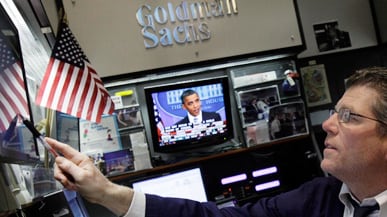The Democrats’ line on the budget, shared by most mainstream economists, has been the same throughout the economic crisis—when the economy is weak, you run a deficit. Jobs are still scarce, growth is still fragile, so the borrowing must continue.

But until when? The latest figures from the CBO, released today, put the deficit projections for next year ballooning to $1.5 trillion thanks to a bipartisan tax deal and weak growth. President Obama has called for new investment in future growth, which would add further billions to the deficit. A number of economists have called on lawmakers to push deficits even higher in order to get jobs numbers back on track. Is there any point at which even these short-term deficits have to be rapidly reined in?
I asked a few of the most prominent pro-spending evangelists, all of whom backed The Daily Beast's Reboot America petition last year, for their take on when to finally cut back. Dean Baker, co-director of the Center for Economic and Policy Research, suggested that the deficits continue until either the jobs crisis ends or the economy starts to seize.
"I would look to the unemployment rate and inflation rate as key variables," he said in an e-mail. "If we think that we are getting close to full employment (somewhere around 4.0 percent) and/or inflation seems to be rising rapidly, then you would look to try to slow the economy. However, neither is close to being the case at the moment."
Robert Reich, former Secretary of Labor under President Clinton, wrote in an e-mail that the economy wouldn't be able to stand on its own two feet without major deficits until more progressive tax rates helped get the middle class spending again.
"We need another 18 months to two years before we start imposing the really tough medicine.”
"No amount of stimulus will be enough until and unless the economy is reorganized so that the benefits of economic growth are more widely shared," he wrote. "Normally, it would be safe to hand off the stimulus (fiscal and monetary) to consumers and businesses after a couple of years of what Keynesians call "pump priming.' Problem now is that consumers aren't there for the handoff. They're still under a mountain of debt, can't borrow as before because their homes don't provide adequate collateral, and even if they have jobs their typical wage won't allow for much new spending. In effect, we're now paying the price for thirty years of stagnant wages, while more and more of the nation's income and wealth have concentrated at the top."
Among Democratic deficit hawks, the consensus leans towards continued spending in the near future as well. But many insist that the country needs a long-term deficit reduction plan already in place and primed to go as soon as the economy finds its footing in order to reassure the world that America is addressing its budget problems now.
Sen. Kent Conrad, chair of the budget committee and a member of the Simpson/Bowles deficit commission, noted to The Daily Beast that the most important steps in the blue ribbon panel's plan would only gradually bend the curve on entitlement spending over decades to achieve their goals. But he said the deficit would still have to start coming down sooner than progressive economists suggested.
"We need another 18 months to two years before we start imposing the really tough medicine that is going to have to be imposed if we're going to deal with this long term debt threat," he said. "If you look at all the bipartisan commissions, that is what they have concluded."
In the meantime, the immediate priority for even relatively conservative Democrats like Conrad, who has endorsed plans to reduce the deficit by trillions of dollars over the next decade, is to block Republican efforts to pull the plug on spending too soon. Conrad told the Beast that every bipartisan commission to look at deficit so far had warned against "deep, draconian cuts" while the economy is still weak, a phrase that many Democrats used on Wednesday to critique varying GOP proposals to cut discretionary spending.
"We got to make decisions now that affect that long-term outlook, but that does not endanger this recovery," Conrad said.
Sen. Dick Durbin, another Democratic backer of Simpson/Bowles, also criticized Republicans for what he called a "mindless" opposition to Obama's spending proposals and said any deficit plan shouldn't "jeopardize our economy in this recession." But he suggested that cuts might come even sooner than Conrad suggested, pointing to upcoming budget battles with the GOP this year.
"We are going to be facing spending cuts," he said. "I can’t tell you what the timetable is going to be, but we have two major events coming up soon, the [Continuing Resolution] and the debt ceiling. So those might be triggers for this conversation."
On the Republican side, there's less division on the timing of cuts—every lawmaker appears to want immediate action—but considerably varying opinions on the degree of reductions. GOP lawmakers have put out an array of proposals in recent days aimed at securing spending cuts this year, which they argue would spur economic growth by reassuring businesses that they won't have to be taxed later to pay down the debt. Tea Party-friendly lawmakers Sen. Rand Paul and Rep. Michele Bachmann each have suggested hundreds of billions of dollars in proposed cuts, including an end to the Department of Education, while the Republican Study Committee is out with a proposal to slash $2.5 trillion in spending over the next decade.
Benjamin Sarlin is the Washington correspondent for The Daily Beast and edits the site's politics blog, Beltway Beast. He previously covered New York City politics for The New York Sun and has worked for talkingpointsmemo.com.






